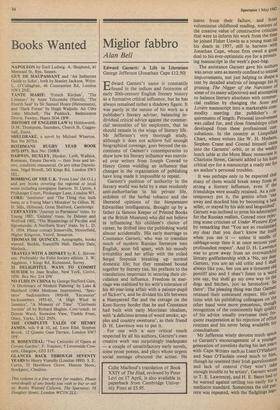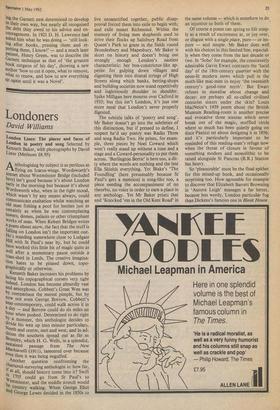Miglior fabbro
Alan Bell
Edward Garnett's name is constantly found in the indices and footnotes of early 20th-century English literary history as a formative critical influence, but he has always remained rather a shadowy figure. It was partly in the nature of his work as a publisher's literary adviser, balancing in- dividual critical advice against the commer- cial necessities of his employers, that he should remain in the wings of literary life. Mr Jefferson's very thorough study, although it does not achieve full enough biographical coverage, goes beyond the en- comiums of Garnett's contemporaries to show how his literary influence was exercis- ed over writers from Joseph Conrad to Henry Green wielding an influence that changes in the organisation of publishing have long made it impossible to repeat.
Garnett's position of authority in the literary world was held by a man resolutely anti-authoritarian 'in his private life, redolent of the herbal tobacco and the liberated opinions of the bienpensant Edwardian intelligentsia. Brought up by a father (a famous Keeper of Printed Books at the British Museum) who did not believe in influencing his children's choice of career, he drifted into the publishing world almost accidentally. His early marriage to Constance Garnett, who was to translate much of modern Russian literature into English, soon fell apart, with his moody irritability and her affair with the exiled Sergei Stepniak breaking up normal domestic life; but they remained bound together by literary ties, his prefaces to the translations important in securing their cir- culation and influence. Freedom in mar- riage was stablised by his wife's tolerance of his 40-year-long affair with a painter-pupil of Sickert's, and he divided his life between a Hampstead flat and the cottage on the Kent-Surrey border that he and Constance had built with early Morrisian idealism, with 'a delicious aroma of wood smoke, ap- ples and country sweetness', as their friend D. H. Lawrence was to put it.
For one with a sure critical touch respected by all his authors, Garnett's own creative work was surprisingly inadequate — a couple of unsatisfactory early novels, some prose poems, and plays whose urgent social message obscured the action. He
learnt from their failure, and from voluminous childhood reading, notions of the creative value of constructive criticism that were to inform his work from the time he joined Fisher Unwin as a young man till his death in 1937, still in harness with Jonathan Cape, whose firm owed a great deal to his ever-optimistic eye for a promis- ing manuscript in the week's post-bag. The assistance Garnett gave his authors was never seen as merely confined to textual improvements, not just helping to shape. a text by detailed analysis of language (as in pruning The Nigger of the Narcissus .of some of its many adjectives) and attemPtIng to balance literary absolutes with commer- cial .realities by changing the Sons and Lovers manuscript into a marketable com- modity meeting the publisher's re- quirements of length. Personal involvement was called for, and close friendships often developed from these professional con- sultations. In the country at Limpsfiela Chart, where writers like W. H. Hudson, Stephen Crane and Conrad himself aloe into the Garnetts' orbit, or at the weekly lunch table at the Mont Blanc restaurant in Charlotte Street, Garnett added to his keen critical eye for a manuscript a ready ear for an author's personal troubles. It was perhaps only to be expected that many of them would break away from s° strong a literary influence, even if the friendships were usually retained. As a con- temporary put it, the genius often '10 away and mocked him by becoming a best seller, or stayed by his side and languished Garnett was inclined to press his admiration for the Russian realists, Conrad once rejec- ting some criticism of Under Western EYe,s by remarking that 'You are so russianisea my dear that you don't know the truth when you see it — unless it smells of cabbage-soup then it at once secures your profoundest respect'. And D. H. Lawrence was to grow away from an overwatchful literary godfathership with a 'No, my dear„ Garnett, you are an old critic and I silo always like you, but you are a tiresome old, pontiff also and I shan't listen to a word you say, but shall go my own way to the dogs and bitches, just as heretofore. SO there'. The pleasing thing was that Garnett retained their continued respect. His rela- tions with his publishing colleagues on the other hand were more precarious, though recognition of the consistently high quality of his advice usually overcame their fre- quent exasperation at his rejection of office routines and his never being available for consultations. Mr Jefferson wisely devotes much space to Garnett's encouragement of a younger generation of novelists during his last years with Cape.Writers such ,as Liam O'FlahertY and Sean O'Faolain owed much to him, though he resented their Irish garrulousness and lack of control ('they won't take enough trouble to be artists', Garnett wrote to T. E. Lawrence), and H. E. Bates had to be warned against settling too easily for 3 mediocre standard. Sometimes the old pat- tern was repeated, with the fledglings lea"'- i118 the Garnett nest determined to develop in their own way, but nearly all recognised the debt they owed to his advice and en- couragement. In 1921 D. H. Lawrence had asked him what he was doing — 'still look- ing after books, pruning them and re- Potting them, I know!' — and a much later Patient, Henry Green, was to describe the Garnett technique as that of 'the greatest book surgeon of his day', showing a new author 'how to cut it open, what to remove, what to renew, and how to sew everything V again until it was a Novel'.







































 Previous page
Previous page